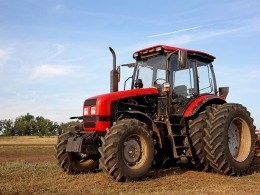
We know that your vehicles are critical to the day to day running of your farm. We understand that you may have a diverse range of motor vehicles such as ATV’s, tractors and combine harvesters in addition to your private cars, commercial vehicles and horseboxes which is why having the right cover is so important. It’s important to choose an insurance policy which gives you the confidence that your vehicles are covered in line with your business needs.
Here are our top 10 things to consider when buying insurance for your vehicles:
1. Know the basics
Insurers will ask you for details about your vehicle(s) including the registration or chassis number, exact make, model and current value so make sure you have this to hand. Some insurers will offer cover for multiple types of vehicles so be prepared by knowing what you want to insure with whom. This can save you time and money, and reduce the need to make changes in the future, avoiding unnecessary fees.
2. What level of cover do you require?
Most insurers will offer three levels of cover including comprehensive, third party fire & theft or third party only. It’s your choice what level of cover you choose but it’s important to note that damage to your vehicle is only covered if you choose comprehensive cover. If you were involved in an accident you would not be able to claim for damage to your vehicle under third party fire & theft or third party only cover.
3. What will you be using the vehicle for?
As businesses grow and diversify, farm motor vehicles are not only used for own use on the farm but are increasing being used for agricultural contracting and other diversifications. If you use your vehicle for anything other than normal farming use it’s important to inform your insurer as it may affect the terms applied by the insurer and may impact your premium.
4. Where will it be kept?
Insurers will often ask where your farm motor vehicle will be kept at night as the location can reduce or increase the risk of your vehicle being broken into or stolen, which in turn has an impact on your premium. If you have more security measures in place to reduce the risk of theft, such as a Thatcham approved immobiliser, the more favourably it will be viewed by your insurer.
5. Have you added any modifications?
Before making any modifications to your vehicle you should think about how it will impact your insurance as modifications can have positive and negative implications. For example if you add additional seating it can be viewed negatively and could increase your premium as it’s not a standard feature of the vehicle. On the other hand if you added security measures such as a Thatcham approved immobiliser it could have a positive influence on your premium.
6. Who's driving?
Many insurers will offer an “open driving” policy which may also have an age restriction against it. For example, any driver excluding drivers under 25. This gives you flexibility, allowing anyone who meets this criteria to drive your vehicle. By having an open driving policy you won’t need to contact your insurer if you employ someone new as long as they have no adverse experience such as convictions or claims. Alternatively, some insurers offer restricted driving where you will be required to specify driver details. Whether you opt for open or restricted driving both have their benefits and will suit different farming operations.
7. Voluntary excess
It’s up to you how much excess you want to pay in the event of a claim. Sometimes having a larger excess can lower your premium but you should consider what you would have to pay in the event of a claim. Remember any voluntary excess you choose will be in addition to any compulsory excess the insurer has applied.
8. Shop around
Prices can vary amongst insurers. That’s why in order to get the best value you should considering requesting quotes from more than one insurer. This is one of the key benefits of working with a broker as they do all the work for you.
9. Don't be led by price
Although there may be cheaper rates in the market it doesn’t necessarily mean the cover is adequate for your business. It’s important to make sure the level of cover included in your policy is right for you before accepting a quote.
10. Review your insurance
Whether you intend to buy, sell or hire in an agricultural vehicle make sure any changes are reflected in your farm motor policy.
Knowing the details of your vehicles and how they’re going to be used are key to making sure the insurance you get matches the needs of your agricultural business. Having the right farm motor insurance is essential to the day to day running of your farm.
